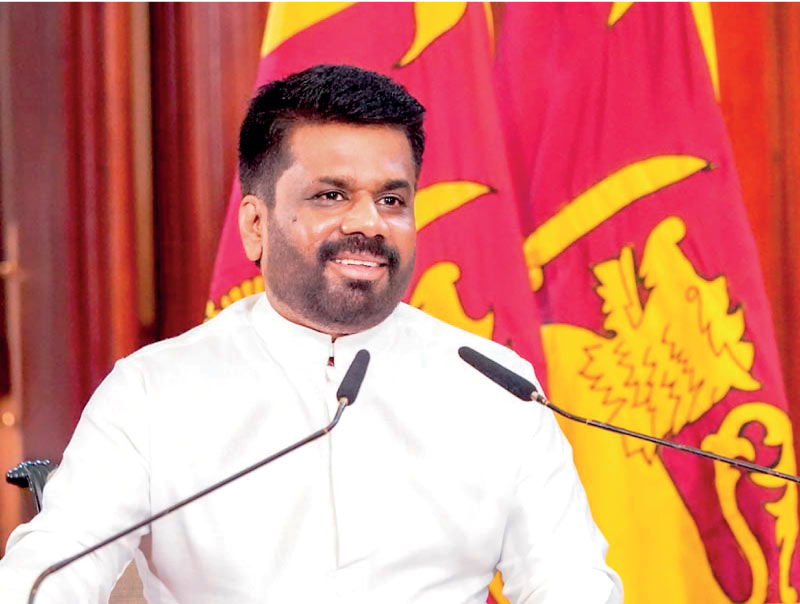Saturday Feb 14, 2026
Saturday Feb 14, 2026
Thursday, 20 February 2025 00:45 - - {{hitsCtrl.values.hits}}

We have finally embarked on our journey towards proper solidarity and true ethnic reconciliation, and we certainly have a leader with a mindset capable of leading us through this positive redirection of our war-torn country
|
 President Anura Kumara Dissanayake’s (AKD) recent visit to the Northern Province of Sri Lanka is just the beginning of a transformative shift in the socio-political dynamics of Sri Lanka and the potential to finally create positive change.
President Anura Kumara Dissanayake’s (AKD) recent visit to the Northern Province of Sri Lanka is just the beginning of a transformative shift in the socio-political dynamics of Sri Lanka and the potential to finally create positive change.
It has been 15 years since the end of the Sri Lankan civil war. Unfortunately, up until now, Sri Lanka has been struggling under a very repressive system of impunity. Impunity refers to the situation where perpetrators of serious human rights violations are not held accountable for their actions, escaping justice and facing no consequences for their actions, often hindering the process of rebuilding a society after conflict or repression. It is common knowledge to say that Sri Lanka’s past politicians and leaders were all guilty of something, be it corruption, war crimes, or murder.
The United Nations High Commissioner for Human Rights in their August 2024 report on the situation of human rights in Sri Lanka stated, “The unwillingness or inability of the State to prosecute and punish perpetrators of crimes is best illustrated by the lack of meaningful progress in emblematic cases. This entrenched impunity has also manifested itself in the corruption, abuse of power and governance failures that were among the root causes of the country’s recent economic crisis.” The OHCHR has repeatedly, year after year, stressed the need to address governance factors and root causes that contributed to the economic and political crisis in Sri Lanka, all of which severely impacts the state of human rights in the country.
Prioritise reconciliation between ethnicities
For a true eradication of impunity to take place in the whole island, Sri Lanka needs to prioritise reconciliation between its ethnicities. Reconciliation in simple terms refers to the restoring of friendly relations. In justice lingo, it refers to the process of rebuilding relationships and trust within a society that has experienced widespread violence or human rights abuses, aiming to foster a shared future by addressing past harms through mechanisms like truth-telling, reparations, and dialogue between victim and perpetrator groups, ultimately seeking to create a more peaceful and stable society.
Sri Lanka has been in dire need of a leader who understands the need for reconciliation, a government that will seek to eradicate corruption, not one that will thrive in it. According to the OHCHR, the Interim Secretariat of the Truth and Reconciliation Commission undertook 65 consultations last year. A common theme was that civic society has been calling for the Government to first take steps to create an environment for reconciliation. Can this environment for reconciliation finally be created under this new Government?
President Dissanayake since his appointment, has taken certain actions towards freeing the Tamil populace from their struggles. Notable of which are his promise to resolve the decades-long land disputes in the North, allowing Tamils to memorialise their dead through celebrating Maaveerar Naal and removing the civilian Elephant Pass checkpoint. He has also communicated that the Government plans to invest in rebuilding the infrastructure in the North, such as for the cement factory that can thrive with the natural resources in Kankesanthurai – an investment which will surely increase the number of job opportunities and begin a new age of trade welfare in the North. Such motives have all signalled attempts towards reconciliation.
Opportunity to finally unite as one Sri Lanka
President Dissanayake began his speech with clear communication regarding the divisive politics of the past. Thanking the Tamils of the North for their faith in him he delivered that now we have “the opportunity to finally unite as one Sri Lanka”, emphasising that up until now political leadership around the country was strengthened through the deliberate division of the populace, creating wars rooted in doubt and opposition with various conflicts. He then directed a question at the people: “Do we still need to be living in disharmony? Do we need to live in separation?” The people responded with hands and heads waving a clear “No!”
President Dissanayake then went on to emphasise that for the first time in the history of Sri Lanka we have created a Government focused on uniting the people, instead of separating the people, further pointing out that past politicians have never visited these areas in the North because of such divisive politics.
In addition to an acknowledgement of past divisive politics and a clear intent that Sri Lankan politics will finally be more unifying in nature, he spoke transparently about the Sri Lankan civil war – which it is noteworthy to mention, no other past leader has even attempted at acknowledging with the Tamil people. Attributing our nation’s war towards an intentionally divisive political agenda, he stated that: “Even though we may have been separated in the past…even though our past generations waged war, we cannot create grounds for our future generations to wage war.” Putting in the work to actively create a more reconciled environment upon which the younger generation can grow is a must to create a truly peaceful and united Sri Lanka.
Empower younger generations through education
How can this take place? The President detailed his plans to invest in the education of children all over the country and to increase work opportunities in the Northern Province. A deliberate move to empower younger generations through education is vital. Sri Lanka has always valued education, this is clear in our scholarship systems and our access to free and public education not only during primary education but also higher education. Now providing even more access to education and creating employment opportunities past graduation will go a long way.
Another key part of his speech was his proposal to have a new festival in October that brings together all religions and ethnicities.
“...Without the differentiation of Sinhalese, Tamils and Muslims, without the differentiation of Buddhists, Hindus, Christians and Muslims, we will celebrate a festival that brings us all together – Yay or Nay?... this festival will celebrate all peoples, their respective cultures including cultural habits, attires, and cuisines.”
To emphasise the importance of his proposal, let me shed light on another part of the world with similar roots in ethnic discrimination. In Rwanda, after decades of ethnic conflict, the government deemed it illegal to ethnically differentiate and say you were a “Hutu” or a “Tutsi”, forcing people to lose their relevant ethnic names and all be called “Rwandan” instead. Some may view this blanket override of one’s ethnicity as an easy solution to their past problems which were so rooted in ethnic discrimination. While it surely helped in reducing the country’s ethnic discrimination in education and other structural aspects, this removal and suppression of ethnic identity undermined the aim of reconciliation.
In bringing about a forced acceptance of the people’s identity as Rwandan and Rwandan alone, the government caused a repression of the history of their ethnic identities which severely conflicts with the need for ethnic history so as to make sense of people’s stories of individual suffering. In making ethnicity a taboo, the Rwandan government denied survivors a full expression of the suffering they went through during the civil war, not only physically but psychologically and emotionally as well.
Differences as a point for reconciliation
Whilst the prioritisation of their ethnic differences surely were the source of their conflict, there comes a point in post war peace when one must not strive to forget or eradicate one’s identity, but rather use such differences as a point for reconciliation. This is what President Anura Kumara Dissanayake is striving to do. His creation of a festival that celebrates on the same day, a Buddhist’s, a Hindu’s, a Muslim’s and a Christian’s religious beliefs, very clearly creates a shared identity as Sri Lankan whilst also respecting and celebrating each other’s religious and ethnic differences. This is probably as smart as we can get to build peace and reconciliation in Sri Lanka.
After decades of living under a system of corruption, periods of debilitating censorship and structural impunity, we certainly have a long way to go to achieve a truly reconciled Sri Lanka. However, we have finally embarked on our journey towards proper solidarity and true ethnic reconciliation, and we certainly have a leader with a mindset capable of leading us through this positive redirection of our war-torn country.
Just this past week, we celebrated independence from colonisation. Perhaps now it is time to put in the work towards celebrating a true independence from corruption, injustice and a highly restrictive and impugn political system. The Prime Minister of Sri Lanka, Dr. Harini Amarasuriya wrote in her independence day message that, “Independence is not just about sovereignty; it is about dignity, justice, and the right to a life free from oppression.” With our combined effort, we can find this true independence which is established in the strongest form of solidarity amongst a sovereign nation’s people, and a pride that comes with being a truly reconciled Sri Lanka.
References:
A/HRC/57/19: Situation of human rights in Sri Lanka - Comprehensive report of the United Nations High Commissioner for Human Rights - Advance unedited version | OHCHR
LIVE: யாழில் அநுரவின் மாபெரும் ஒன்றுகூடல்
I President AKD visits
Jaffna today
Message from the Prime Minister on Sri Lanka’s 77th Independence Day
People’s land should rightfully belong to them: President | Daily FT
The Challenging Road to Reconciliation in Rwanda: Societal Processes, Interventions and Their Evaluation
(The writer holds an M.Sc in Peace and Conflict Resolution, University of San Diego, and is a scholar in Transitional Justice, Human Rights and International Law.)